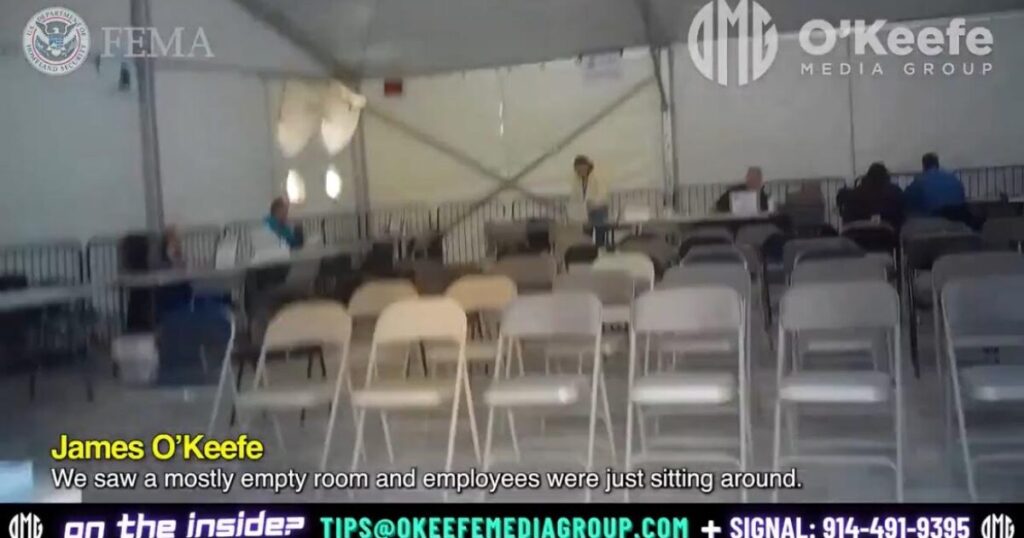O’Keefe Media Group (OMG) recently launched an investigation into the Federal Emergency Management Agency (FEMA) to scrutinize their disaster recovery efforts following Hurricane Milton, which devastated parts of Florida and the Carolinas. In a series of video exposés, OMG highlighted the inadequacies of FEMA’s response, particularly in North Carolina, where many residents are still suffering long after the storm. In a recent installment, James O’Keefe revealed his infiltration into empty FEMA disaster recovery centers and captured residents’ frustrations regarding the lack of timely assistance. The narratives shared by community members reflect the dire circumstances they are encountering, compounded by FEMA’s apparent negligence and bureaucratic delays.
The investigation began two months after Hurricane Milton, which left numerous individuals without adequate aid or shelter. During a Buncombe County Commissioner meeting, residents voiced urgent concerns for their safety, particularly the risk of freezing as winter approached. Many residents expressed their disillusionment with public officials, stating that they had witnessed an unprecedented level of inaction from government entities that are supposed to provide assistance in times of crisis. The evident distress of the residents sheds light on a broader issue of government accountability and responsiveness during natural disasters, prompting questions about the effectiveness of FEMA’s operations and protocols in such situations.
In previous installments, O’Keefe documented the aftermath of Hurricane Helene in North Carolina, where significant damage was evident. Footage showed the destruction of homes, churches, and infrastructure, alongside polluted waterways, while residents continued to suffer. In one particularly shocking revelation, a resident reported discovering human bones amidst the rubble, raising alarmingly poignant questions about the depth of devastation. This level of tragedy is underscored by the emotional testimonies of those affected, including Tammy Kelly, who criticized FEMA for not providing better accommodations than tents for displaced families. The lack of basic necessities and empathetic responses from federal agencies further incensed those living in the aftermath of the disaster, demonstrating a troubling disconnect between the government’s promises and the actual support provided.
O’Keefe’s initial investigations indicated that FEMA may have been neglectful in its outreach, as there were allegations suggesting relief workers were instructed to bypass homes displaying political affiliations contrary to the federal government. Such actions not only erode trust in governmental institutions but also exacerbate sentiments of injustice among those who feel overlooked. This alleged discrimination against certain groups during recovery efforts raises ethical concerns regarding the application of disaster relief strategies and the inherent responsibility of agencies like FEMA to serve all citizens equitably, regardless of political identity. The implications of these findings pose significant questions about fairness and inclusiveness in emergency management practices.
In further efforts to highlight the inadequacies of FEMA’s response, O’Keefe utilized hidden cameras for a follow-up segment. Inside a FEMA lodging compound in Candler, North Carolina, O’Keefe documented what he perceived as suspicious behavior from FEMA staff. Allegations were made regarding the agency not only refusing interviews but actively attempting to conceal their operations from scrutiny. The behaviors observed—such as abruptly shutting gates and turning badges around—instilled a sense of mistrust about FEMA’s transparency and accountability during a critical recovery period. Such questionable practices contribute to the growing concern over authority figures who may prioritize secrecy over responsibility, unfortunately exacerbating public anxiety and frustration during crises.
As the investigations by O’Keefe Media Group continue to unfold, they shine a light on the imperative need for governmental agencies to be held accountable for their actions during emergencies. The heart-wrenching experiences shared by residents, coupled with the lack of effective intervention by FEMA, underscore the limitations of current disaster management systems and raise critical questions about the adequacy of their protocols in safeguarding the welfare of affected communities. It is essential for officials to reassess their strategies and ensure that the needs of all citizens are met swiftly and compassionately, particularly in times of dire need.
In summation, the investigation by O’Keefe Media Group into FEMA’s response to natural disasters reveals significant failings in disaster relief efforts, particularly following hurricanes. The emotional turmoil and visible suffering of residents signal a critical need for reform in how agencies like FEMA operate, respond to emergencies, and engage with affected communities. The exposé does not merely serve as an indictment of FEMA’s current practices; rather, it highlights a call to action for both governmental officials and communities to collaborate more effectively and prioritize the needs of those who are vulnerable in the aftermath of disasters.

